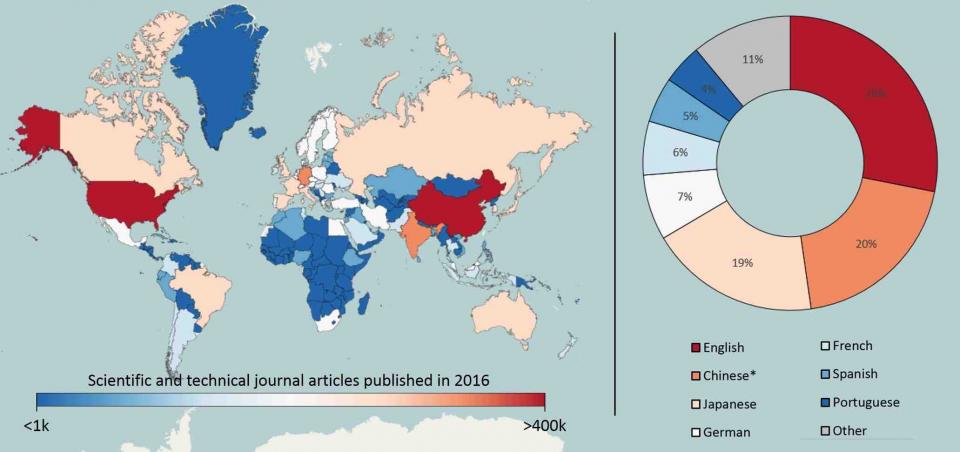6 September 2019
Ben Ablett, First Edition Translations
“Without translation, we would be living in provinces
bordering on silence.”
Migration of learning
There is no doubt that translation has played a vital role
throughout history in the dissemination of knowledge.
As the major centres of learning have migrated through the centuries from Athens to Alexandria to Rome etc, so has the language of knowledge from Greek to Arabic to Latin. Although each of these languages became the lingua franca of their time, the spread and advancement of the wisdom and learning they each imparted would not have been possible without translation.
According to Henry Fischbach, “Translation was the key to scientific progress as it unlocked for each successive inventor and discoverer the mind of predecessors who expressed their innovative thoughts in another language.”
Because of the efforts of those historic scholars and translators we now live in a world where no one geography or culture holds precedence over knowledge. Thousands of years of academic achievements are now available all over the world in hundreds of languages. So does this mean the translator’s job is done?
The new lingua franca
As a result of the continued and widespread dissemination of knowledge throughout history, we now exist in a time where theoretically any city, any country and any language is just as capable of producing ground breaking research as any other. However, one language prevails as the new lingua franca of the scholarly world and that is English.
Data collected from Scopus in 2012 shows just how dominant English has become and it also shows the trend growing with some countries publishing in excess of twenty times as much research in English as in their own mother tongue.
The 2018 Highly Cited Researchers list compiled by Clarivate Analytics shows that of the 4,058 researchers identified as being the most influential in their respective fields 89% were from English speaking countries with the remaining 11% almost all publishing in English.
This trend presents two problems. The first being that some of the world’s most significant research is only accessible to approximately 20% of the total population who can understand English either as their mother tongue or as a second language. That ignores a potential addressable audience of around 6.5 billion people. While it would be fair to argue that the vast majority of the global academic community are likely to fall in to the 20% that have a firm enough grasp of English to digest this research, this still doesn’t exactly seem to fit with the ideal of making information and knowledge accessible to all.
The second issue, and perhaps the more concerning of the two, is the need to publish in English in order to get noticed. For a researcher to feature on any of the indexing services such as Scopus or Web of Science, their work must at the very least have an English title and an English abstract. What are the wider implications of this and how much innovative thinking is being overlooked?
Missed opportunities
It is a given that significant steps will always continue to be made in every field of learning but there is no longer a guarantee that those findings will be in a language that the wider academic community are familiar with.
Left: scientific and technical journal articles published during 2016 (The World Bank)
Right: languages of articles on Google Scholar (Data based on the 13 languages represented on Google Scholar)
*Data collected for Chinese language articles includes both Simplified Chinese and Traditional Chinese
The above infographic illustrates just how dispersed academic prowess now is. Although the US and China lead the way, due largely to the fact that they both invest more in research than any other countries ($511 billion and $451 billion per anum respectively based on UNESCO 2016 data) there is still a significant amount of published research coming out of almost every other country around the world.
What is even more interesting is that despite English firmly establishing itself as the academic lingua franca over the last century, many of these countries are publishing work in their own native tongue. Data collected from Google Scholar shows that English only accounts for 28% of all their articles, with Chinese (both traditional and simplified) and Japanese together making up almost 40% of their published content.
This is a vast amount of knowledge that is not reaching a broad enough audience. Who is to say how many potential cures for disease have been missed, how many new clean fuel types have been overlooked? Or how many other major discoveries have never seen the light of day because they have not received the recognition they deserve and in turn have not had the opportunity to collaborate with other academics to further their findings?
In 2004 Chinese scientists reported that the H5N1 virus had been observed to infect pigs as well as birds. This was of particular significance because pigs are susceptible to human viruses and as such could allow the virus to mutate to a strand that would infect humans too. It was eight months before this information was picked up by the World Health Organisation. Why? Because the research was published in Chinese so little attention was paid to it outside of China. Clearly the consequences could have been much worse if this had gone unnoticed for longer, or had never been noticed at all.
This is but one example, there could easily be countless missed opportunities that the world will never benefit from as a result of the bias for English content. The only way to mitigate this risk and ensure such research reaches the rest of the world is if it is meticulously translated by skilled linguists that have a strong technical working knowledge of the subject matter in question.
Translation can help
There is no denying that a common language amongst peers also has many advantages. This is why a lingua franca has survived in one form or another through the centuries and the data doesn’t suggest that it is about to change. What has changed though is the fact that knowledge is no longer the domain of the privileged, we have become a more enlightened society that understands the benefits of sharing knowledge and making learning available to all. Never before have so many speakers of other languages stood to benefit from what is produced in the lingua franca, nor have they had the capacity and ability to contribute towards it as they do now. Yet this dominance of English perpetuates its own kind of elitism, a system which disadvantages non-English speakers seeking to learn and virtually forces those wishing to get their work noticed to publish in English. This seems dramatically at odds with the general concept of sharing knowledge for the benefit of all.
Translation can resolve all of this and it is for that reason that translation continues to be vital. It has proved to be an instrumental aid to the advancement of learning in the past and it must continue to do so now and in to the future.
Now more than ever the job of the translator is essential in breaking down barriers and ensuring that knowledge reaches the widest audience possible.
These views are the author’s own and do not necessarily reflect the views of UKSG.
Further Reading:
‘English Is the Language of Science. That Isn’t Always a Good Thing’
‘Languages Are Still a Major Barrier to Global Science’
‘The Dangers of English as Lingua Franca of Journals’
‘The Language of (Future) Scientific Communication’
‘Why English as the Universal Language of Science Is a Problem’


